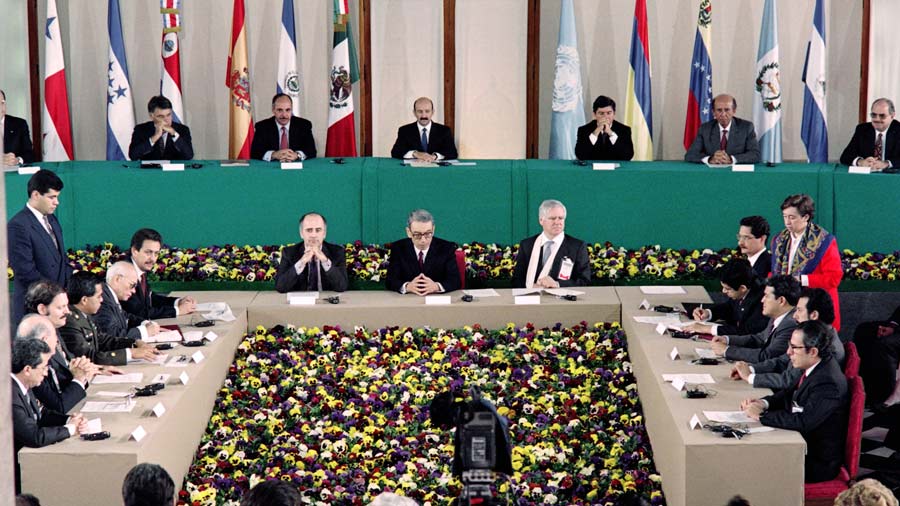
Today’s Diary joins the commemoration of the anniversary of one of the most important milestones and that opened the door to building democracy and freedom.
29 years ago, minus one day, the silence of the rifles was signed and that is no small thing. For a country that experienced repression, political violence, persecution of dissent and where the political and economic system was designed to avoid significant reforms and silence opposing voices, turn the page on war and enter the seas uncertainties of democracy is a very important milestone.
This January 16, 1992, at Chapultepec Castle in Mexico City, the foundations of a Republic were laid where differences are administered in a peaceful, political, and civilized manner.
Advances and setbacks
As is natural in any human process, especially one involving a society and its political future, not everything has been a steady advance towards greater democracy and freedom.
In this period, in which governments of three different partisan flags with different visions have paraded at 07:00, El Salvador has experienced corruption, abuses of power, nepotism and vices of power that emulate the years before the armed conflict.
Special: Faces and voices of conflict
But attributing these vices to the Peace Accords is an act of historical myopia, ignorance, or complete malice, when these generated an institutional plot that seeks to prevent and punish these excesses.
While there have been setbacks in the democracy that was dreamed of, the foundations that were laid in the Peace Accords have allowed, among other things, that these political differences are no longer resolved in the old way: using repression, the kidnappings, torture and disappearances as methods of pressure or everyday political tools.
That a Salvadoran encounters research articles that account for signs of corruption in past or present administrations testifies to the significant advancement of press freedom and independent journalism, fundamental pillars of a democracy and that allow the citizen know what happens to the money you pay in taxes.
That a journalist can ask difficult and awkward questions to a government and not disappear in a few days is a sign that the signature of the long-awaited Paul has served the citizen to be more informed, empowered and able to make better decisions.
That a group of citizens is protesting what seems to them to be a mismanagement of public resources and not encountering the heavy boot of repression is a clear sign that in 1992 it was said no more! to political violence.
The price of oblivion and impunity
That security forces must submit to civilian power and respect human rights seemed unthinkable three decades ago and today is a non-negotiable feature.
That the rulers are not unattainable is a fundamental conquest of the Peace Accords.
Politics always outraged the citizen. But before the agreement signed in Chapultepec, the options for organizing and expressing discontent were limited and very dangerous. An undeniable success of peace is the faculty of answering indignation with discomfort to rulers.
Whether with reports and journalism, with peaceful protests on different platforms or by activating the institutional framework and controls in power, since 1992 Salvadorans can demand that the government be accountable, accountable and transparent in its use. of public funds to prevent waste or theft.
To deny these advances is, therefore, either foolish or motivated by perverse pretensions.
What was peace?
The Peace Accords did not amount to delivering a finished country all of a sudden, and automatically better and more prosperous than the day before.
What they allowed was to generate the platforms so that the Salvadorans could discuss what kind of country they wanted to build. Arguing, not dictating or forcing, much less with the false “eloquence” that comes from having the submissive arms of the ruler’s side.
“The Peace Accords were not useless or a farce,” academics and political leaders say in Bukele.
El Salvador is far from a dream country. Opportunities for significant economic progress are scarce. Violence continues to stalk thousands of compatriots day in and day out and force displacement or migration to hundreds more. Public resources continue to be seen as a bank at the discretion of those who govern.
But these are not problems of having signed the peace. On the contrary, the advances that have been made, which are many and significant, realize that what the country needs is to deepen the path embodied in 1992 and not undo the significant democratic process achieved since then.
The signing of the Peace Accords was not an “end of history” but the beginning of a construction in which everyone can and must be protagonists, participating, activating institutions and even disturbing power.
Trying to deny this historical process now is very dangerous. Denying the value of security forces being professional and apolitical, denying political pluralism and pretending to have “official voices”, silencing the press and opposing the Peace Accords can only respond to wanting to start a “new” story that really it evokes the darkest and cavernous past of repression and abuses of power.